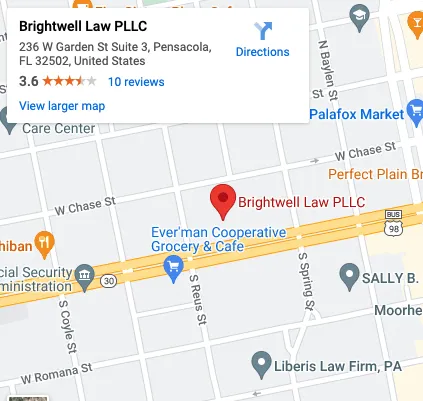Living Wills Attorney in Pensacola, Florida

Everybody needs a will, regardless of how much property they own or how their financial condition is. Without a will, your assets can be stuck in the probate process for a long time, leaving the courts to make the final determination of who gets to inherit your property. A living will is one crucial estate planning document. Living wills, commonly referred to as advanced directives, lay out your wishes in writing regarding future health care decisions if you become incapacitated. Therefore, it is wise to work with a skilled Pensacola living wills attorney.
At Brightwell Law, our Florida estate planning lawyer is ready to help you at each stage of the procedure and make sure your preferences are carried out. We work together with our clients to create the estate plan that is ideal for them since we have an in-depth understanding of living wills and other crucial estate planning instruments. Because of our many years of extensive experience, we can create estate plans of various degrees of complexity with innovative solutions.
Contact our Florida living wills attorney right away to provide you with legal advice and legal services so we can help you solve your legal needs.
Why do I need a Living Wills lawyer in Florida?
A Florida resident can draft their own will without the assistance of an attorney or a document agency. However, the individual will still be required to adhere to all of the will requirements set down by Florida statute, which is difficult for people who are unfamiliar with the subject. Getting an experienced living will attorney in Florida will help you simplify this legal issue and prevent uncertainty that could have significant consequences.
It’s important to have a wide range of experience when writing a living will. You will receive the personal care and consideration you require from our Pensacola living will attorney. We’ll give you wise counsel, outstanding work, and top-notch service. Contact our law firm right away for assistance with your living will!
What is a Living Will?
In reality, living wills are not wills at all. Instead, a living will (also referred to as a healthcare directive or directive to physicians) is a document that specifies a person’s wishes and preferences for medical care if they are unable to transmit these instructions due to a fatal disease or permanent unconsciousness.
The first living wills aided those who preferred a natural death free from the use of modern medical procedures and mechanical life support. These documents eventually started to cover other medical issues including tube feeding, organ donation, and resuscitation as they gained popularity and were made more readily accessible by local regulations.
While living wills are legal in every jurisdiction, there are occasionally formalities that must be followed for them to be effective. A living will obligates medical professionals to follow its directions if it is valid.
What Can Be Covered by a Living Will?
Many people think that living wills simply tell medical professionals to withhold treatment. While many prefer to provide that kind of guidance, a living will also enable a person to request all available medical procedures and treatments or to select some and reject others.
A doctor’s advice may help clarify the many treatment options and assist the patient in making decisions regarding their living will because a living will entails complex medical considerations. Some people choose not to finish their living wills out of concern that doctors could let them pass away when there is still hope for recovery. A living will, however, cannot be legally enforceable unless a patient is found to be terminally ill or in a permanent vegetative state, making it impossible for them to express their medical preferences.
Which Procedure Types Are Covered?
The following are some of the most typical topics included in living wills:
- Life Support
In cases where a patient’s body is unable to maintain life on its own, life-sustaining treatment is administered. If your kidneys quit filtering your blood, treatment options range from respirators that fill your lungs with air to dialysis. Life support may be provided temporarily or permanently, depending on the circumstances.
- Palliative Care
Pain and stress brought on by severe illnesses are intended to be managed by this type of treatment. Palliative care can assist sustain your quality of life in your final days, even if you decide against receiving some types of life support.
- Hydration and Nutrition
Several medical procedures can provide your body with hydration and nutrition if you are unable to eat or drink due to incapacitation (for example, if an accident or sickness puts you in a protracted coma). Instances that are frequently used are intravenous (IV) drips and tube feeding. In some circumstances, these therapies can keep patients alive for years.
- Body Disposition and Organ Donation
You can specify in your living will what should happen to your body and organs when you pass away. For example, you can select whether you would wish to be cremated or buried. A lot of people also decide to give their bodies for scientific research, as well as their organs to other patients.
- Philosophical or religious preferences
Moreover, your living will may contain directives that carry out your philosophical or religious preferences.
Is a living will suitable for you? There are several ways to respond to that question, but speaking with our Pensacola living wills attorney at Brightwell Law right now may be the most sensible course of action.
Would a Living Will Benefit You?
Making a living will and deciding to donate your organs are both personal choices. The choice invites us to consider two scenarios that may be difficult for us to imagine: permanent unconsciousness or impending death. But we might be able to visualize the effects of such a situation on our loved ones. When there is little to no possibility of recovery, maintaining one’s life might have significant financial and emotional consequences. A major motivation for the development of living wills was and continues to be preventing the depletion of an estate that could be left to loved ones.
A living will is just one type of end-of-life planning. It complements a regular will, which takes effect upon death. In a sense, a living will serves as insurance against the failure of a traditional will by preventing the author from being left alive on the verge of passing away, while the assets that would otherwise pass through the will are spent on medical costs.
Ensure Your Living Will is Distributed to the Right People
If you are unconscious, you cannot notify your medical team and close family members where your living will is. Give copies of your completed living will to your primary care physician, your health care agent, and any family member or friends you want to get one. Give a copy to the doctors and facilities if you plan to undergo surgery or are going to be admitted to a hospital or healthcare institution.
When necessary, revise, revoke, or review your living will
Things change, and individuals develop. If you write a living will when you’re 25, it could not reflect your intentions for medical care when you’re 55 or 85. You might have gotten married, or given birth to children or grandchildren. You may have also developed a challenging medical issue.
Review your current living will if you believe you require a new one. If you decide it no longer serves your purposes, you can revoke it and write a new one. Always put your living will revocation without making a new one in writing.
If someone still possesses a copy of your old living will, destroying it without establishing a new one or a written revocation could lead to uncertainty. Inform the individuals who have copies of your previous living will and give them a copy of your new living will or written revocation if you revise or revoke it.
Even if you do not have an attorney design your living will, having it reviewed by one can help you feel confident that it reflects both your preferences and Florida law. Your living will, durable power of attorney for healthcare, and any other estate planning requirements can be handled by our knowledgeable Florida estate planning lawyer.
Powers of Attorney for Healthcare vs Living Will
Some of the duties of a living will can be carried out by a durable power of attorney (DPOA). This agreement grants an attorney-in-fact the legal authority to make healthcare choices on behalf of a person who is unable to do so on their own. A DPOA is different from a living will in that it may advise the attorney-in-fact to follow the directives of the living will or it may provide the attorney-in-fact discretion.
The living will itself may also name a proxy to assist in carrying out its provisions. A durable power of attorney can be utilized whenever the person granting it is unable to make their own healthcare decisions; it is not necessary for the person granting it to be terminally ill or permanently unconscious for it to take effect. Both documents are advised by our estate planning attorneys to cover all eventualities.
Family members can wind up fighting over which treatments should be given or withheld in the absence of a living will or durable power of attorney. Doctors will only consult family members when making medical decisions; if a patient would rather have a friend or unmarried partner involved, a living will and DPOA will allow them to do so.
Living Wills after Death
Except for some living wills or powers of attorney that provide healthcare agents the right to decide on organ donation or autopsy, any authority granted by a living will terminates upon the death of the person who created it. The authority is temporary though, as those choices must be made very quickly after death.
Call our Pensacola Living Wills Attorney Now!
A living will is a crucial component of an estate plan. The preparation of this legal document on your own using a “do-it-yourself” kit may be possible, but there may be unforeseen effects. These kits may be legal and valid, but they’re typically quite basic and do not consider particular circumstances or the potential legal repercussions of different selections you make. You may make sure that these documents are made in a way that completely protects your interests and takes into account all possible outcomes by working with a skilled lawyer.
Our reputed Pensacola living wills attorney at Brightwell Law takes the time to learn about our individual client’s particular needs and then uses this information to craft the best estate plan possible. Call us right away or leave us a message on our web page to schedule a private consultation with our lawyer and satisfy your special needs.


